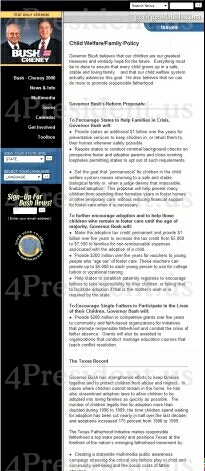|

George W. Bush 2000 On The Issues
Child
Welfare/Family Policy
Governor Bush believes that our
children are our greatest treasures and embody hope for the future. Everything
must be to done to ensure that every child grows up in a safe, stable and
loving family… and that our child welfare system actually advances this
goal. He also believes that we can do more to promote responsible
fatherhood.
Governor Bush’s Reform Proposals:
To Encourage States to Help Families in Crisis, Governor Bush will:
- Provide states an additional $1 billion over five years for
preventative services to keep children in, or return them to, their
homes whenever safely possible.
- Require states to conduct criminal background checks on prospective
foster and adoptive parents and close existing loopholes permitting
states to opt out of such requirements.
- Set the goal that “permanence” for children in the child welfare
system means returning to a safe and stable biological family or, when
a judge deems that impossible, finalized adoption. This proposal
will help prevent many children from spending their formative years in
foster homes or other temporary care, without reducing financial
support for foster care when it is necessary.
To further encourage adoption and to help those children who remain
in foster care until the age of majority, Governor Bush will:
- Make the adoption tax credit permanent and provide $1 billion over
five years to increase the tax credit from $5,000 to $7,500 to
families for non-reimbursable expenses associated with the adoption of
a child.
- Provide $300 million over five years for vouchers to young people
who “age out” of foster care. These vouchers can provide up to
$5,000 to each young person to use for college tuition or vocational
training.
- Help states to establish paternity registries to encourage fathers
to take responsibility for their children, or failing that, to
facilitate adoption if that is the mother’s wish or is required by
the state.
To Encourage Single Fathers to Participate in the Lives of their
Children, Governor Bush will:
- Provide $200 million in competitive grants over five years to
community and faith-based organizations for initiatives that promote
responsible fatherhood and combat the crisis of father absence. Grants
will also be awarded to organizations that conduct marriage education
courses that teach conflict resolution.
The Texas Record
Governor Bush has strengthened efforts to keep families together and
to protect children from abuse and neglect. In cases where
children cannot remain in the home, he has also streamlined adoption
laws to allow children to be adopted into loving families as quickly
as possible. The number of children legally free for adoption
more than doubled during 1996 to 1999; the time children spend waiting
for adoption has been cut nearly in half over the last decade; and
adoptions increased 175 percent from 1996 to 1999.
The Texas Fatherhood Initiative makes responsible fatherhood a top
state priority and positions Texas at the forefront of the nation’s
emerging fatherhood movement by:
- Creating a statewide multimedia public awareness campaign stressing
the critical role fathers play in child and community well-being and
the social costs of father absence;
- Conducting a series of local fatherhood forums to mobilize every
sector of community leadership – religious, business, education,
media, health, government, and others – and develop strategic plans
at the grassroots level;
- Establishing a Texas Fatherhood Resource Center to (i) provide
state-of-the-art resource materials, training, and technical
assistance; (ii) facilitate the sharing of ideas, best practices, and
model programs; (iii) help programs better reach all father
populations – teen, low-income, incarcerated, single or expectant
fathers, step-fathers, and others; and (iv) conduct several regional
events to help social service organizations make their services more
father-inclusive and outcome-based; and
- Developing a seed grant program to help local grassroots
organizations launch or expand innovative local projects that promote
and support responsible fatherhood.
Texas is at the vanguard of this bipartisan movement. A 1999 report, Map
and Track: State Initiatives to Encourage Responsible Fatherhood,
by the National Center for Children in Poverty showed that Texas was
one of only 10 states that had enacted all five fatherhood strategies
identified by the Center as important to child development.
Source: George W. Bush for President 2000 Web Site |
|